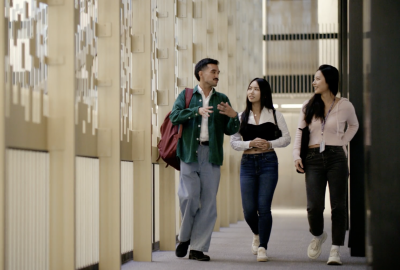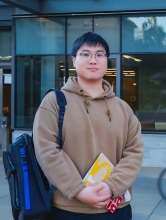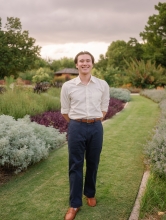
Still Accepting Applications

Mars Jiang
Cross-Cultural Exchange and Study Abroad Track
Started the program Fall '25; Expected to graduate Fall '26
Why did you choose the NYU International Education MA Program?
I chose the NYU International Education program primarily because of the university's outstanding academic reputation and its rigorous, well-respected curriculum. Beyond the classroom, New York City itself was a massive draw for me due to its incredibly diverse and vibrant cultural environment. Living and studying in such a multicultural hub allows me to experience global interactions firsthand every single day.
What are some of the highlights from your academic career here at NYU?
One of the most significant highlights of my time here has been learning from professors who guide us to examine international education from a wide variety of analytical perspectives. More importantly, they consistently support us in taking these diverse theoretical frameworks and applying them to practical, real-world scenarios. This has been a transformative experience for me, as before joining the program, I mistakenly believed that working in international education simply meant being a teacher. The program has completely broadened my horizons, showing me the dynamic and multifaceted nature of the field.
How has the "Cross-Cultural Exchange and Study Abroad" track complemented your academic interests and/or professional goals?
Having earned my undergraduate degree in translation and interpretation, I have always been deeply passionate about breaking down barriers and contributing to effective cross-cultural communication. The "Cross-Cultural Exchange and Study Abroad" track serves as a natural extension of my academic interests, providing me with the specialized knowledge to design and facilitate meaningful global experiences. It has shown me that international education is an incredibly powerful medium for achieving my long-term professional goal of fostering mutual understanding between different communities. This track perfectly aligns my background in language with my dedication to global exchange.

Christian Wong
Cross-Cultural Exchange and Study Abroad Track
Started the program Fall '25; Expected to graduate Fall '26
Why did you choose the NYU International Education MA Program?
I chose the NYU International Education program because of my history as a New York City public school educator. I have experience working with students from various backgrounds, and I believe learning skills to facilitate cross-cultural exchange is a pathway to empathy building and progress. As local communities diversify and become more global, we need to prepare for the conversations and interactions of an intercultural society.
What are some of the highlights from your academic career here at NYU?
The "Cross-Cultural Exchange and Study Abroad" track has prepared me to move my educational career past the classroom. While teaching holds a dear place in my heart, the skills and connections I have made throughout my coursework have prepared me to take an administrative leap in my professional pathway. I hope with my developing expertise in International Education, I can support students and learning institutions to promote mobility and intercultural teaching practices.
How has the "Cross-Cultural Exchange and Study Abroad" track complemented your academic interests and/or professional goals?
A highlight of my academic career so far at NYU's International Education program has been with NYU Professor Dr. Heddy Lauman and Visiting Senior Scholar Dr. Allan Goodman on our course Inside the Global Network University. In this course, we delved into NYU's rich history of International Education with guest speakers from leadership and staff across nearly all of NYU's global academic centers. This course used NYU's unique position as a leader in International Education to provide opportunities for us to converse and network with key members in the field of IE while also providing rigorous coursework that investigated the logistics of managing such a large network.
Hasnaa Naila (Naya)
Cross Cultural Exchange and Study Abroad Track
Started the program Fall '23; Expected to graduate Spring '25
Why did you choose the NYU International Education MA Program?
I chose the IE program at NYU because it offers a wide range of theoretical and practical courses that are highly relevant to real life. The program’s flexibility allows students to explore their academic and professional development through various avenues. I also want to highlight that the NYU IE community is close-knit; I felt included by both fellow students and faculty members even before I submitted my application! Now that I am a student, the IE community has provided immense support for my personal development, from entrusting me with the role of president of the student body (IESB) to helping me with my research conference presentations.
How does the "Cross Cultural Exchange and Study Abroad" Track compliment your academic interests?
As someone from Indonesia, I am glad that NYU offers this track, as the study abroad field is significantly under-researched in my country. The classes in this program have provided me with valuable insights into how study abroad is perceived, planned, and implemented worldwide. This aligns perfectly with my academic interests, particularly in governmental policies and programs related to study abroad, as well as the dynamics between the Global North and South in international education. Through class discussions, I have gained a deeper understanding of how study abroad intersects with global knowledge distribution and how countries and institutions can collaborate to approach it more critically.
